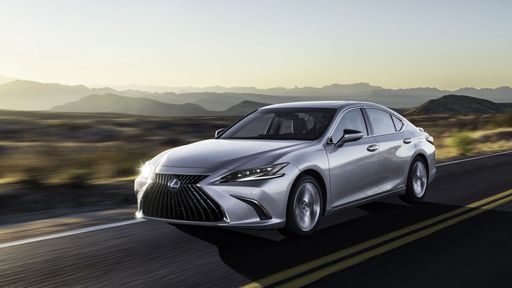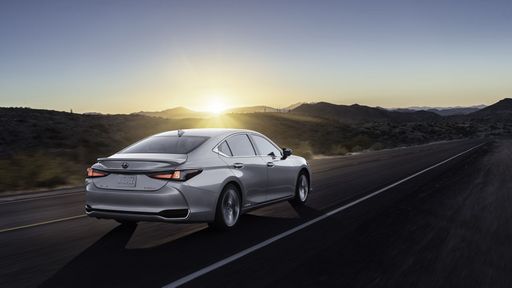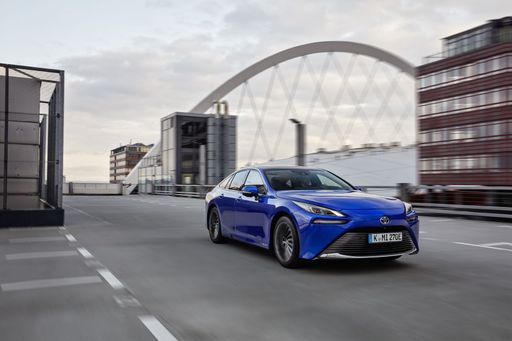Lexus ES vs Toyota Mirai - Differences and prices compared
Compare performance (218 HP vs 182 HP), boot space and price (46600 £ vs 58700 £ ) at a glance. Find out which car is the better choice for you – Lexus ES or Toyota Mirai?
Costs and Efficiency:
Looking at overall running costs, both models reveal some interesting differences in everyday economy.
Lexus ES has a clearly perceptible advantage in terms of price – it starts at 46600 £ , while the Toyota Mirai costs 58700 £ . That’s a price difference of around 12120 £.
Engine and Performance:
Power, torque and acceleration are the classic benchmarks for car enthusiasts – and here, some clear differences start to show.
When it comes to engine power, the Lexus ES has a a bit edge – offering 218 HP compared to 182 HP. That’s roughly 36 HP more horsepower.
In acceleration from 0 to 100 km/h, the Lexus ES is barely noticeable quicker – completing the sprint in 8.90 s, while the Toyota Mirai takes 9.20 s. That’s about 0.30 s faster.
In terms of top speed, the Lexus ES performs slight better – reaching 180 km/h, while the Toyota Mirai tops out at 175 km/h. The difference is around 5 km/h.
Space and Everyday Use:
Beyond pure performance, interior space and usability matter most in daily life. This is where you see which car is more practical and versatile.
Both vehicles offer seating for 5 people.
In curb weight, Lexus ES is a bit lighter – 1680 kg compared to 1900 kg. The difference is around 220 kg.
In terms of boot space, the Lexus ES offers evident more room – 454 L compared to 300 L. That’s a difference of about 154 L.
When it comes to payload, Toyota Mirai minimal takes the win – 515 kg compared to 470 kg. That’s a difference of about 45 kg.
Who wins the race in the data check?
The Lexus ES sits well ahead of its rival in the objective data comparison.
This result only shows which model scores more points on paper – not which of the two cars feels right for you.
Costs and Consumption
View detailed analysis
Engine and Performance
View detailed analysis
Dimensions and Body
View detailed analysis

Lexus ES
Lexus ES
The Lexus ES delivers a supremely comfortable, quietly luxurious experience that favors serene cruising over sporting theatrics. It wraps everyday practicality, top-notch build quality and unimpeachable reliability in a handsome, grown-up package that will appeal to buyers who prize calm refinement over headline-grabbing excitement.
details


Toyota Mirai
The Toyota Mirai arrives as a bold, futuristic saloon that turns heads with sleek, almost sci‑fi styling and a cabin that feels more lounge than cockpit. It trades petrol fuss for a whisper‑quiet hydrogen setup that delivers composed, effortless progress and makes long-distance cruising a relaxed pleasure — a compelling choice if you want cutting-edge eco tech without sacrificing comfort.
details
Costs and Consumption |
|
|---|---|
|
Price
46600 - 59300 £
|
Price
58700 - 66700 £
|
|
Consumption L/100km
5.10 L
|
Consumption L/100km
-
|
|
Consumption kWh/100km
-
|
Consumption kWh/100km
-
|
|
Electric Range
-
|
Electric Range
650 km
|
|
Battery Capacity
-
|
Battery Capacity
-
|
|
co2
115 g/km
|
co2
-
|
|
Fuel tank capacity
50 L
|
Fuel tank capacity
5 L
|
Dimensions and Body |
|
|---|---|
|
Body Type
Sedan
|
Body Type
Sedan
|
|
Seats
5
|
Seats
5
|
|
Doors
4
|
Doors
4
|
|
Curb weight
1680 kg
|
Curb weight
1900 - 1930 kg
|
|
Trunk capacity
454 L
|
Trunk capacity
300 L
|
|
Length
4975 mm
|
Length
4975 mm
|
|
Width
1865 mm
|
Width
1885 mm
|
|
Height
1445 mm
|
Height
1470 mm
|
|
Max trunk capacity
-
|
Max trunk capacity
-
|
|
Payload
470 kg
|
Payload
485 - 515 kg
|
Engine and Performance |
|
|---|---|
|
Engine Type
Full Hybrid
|
Engine Type
Hydrogen
|
|
Transmission
Automatic
|
Transmission
Automatic
|
|
Transmission Detail
CVT
|
Transmission Detail
Reduction Gearbox
|
|
Drive Type
Front-Wheel Drive
|
Drive Type
Rear-Wheel Drive
|
|
Power HP
218 HP
|
Power HP
182 HP
|
|
Acceleration 0-100km/h
8.90 s
|
Acceleration 0-100km/h
9.20 s
|
|
Max Speed
180 km/h
|
Max Speed
175 km/h
|
|
Torque
-
|
Torque
300 Nm
|
|
Number of Cylinders
4
|
Number of Cylinders
-
|
|
Power kW
160 kW
|
Power kW
134 kW
|
|
Engine capacity
2487 cm3
|
Engine capacity
-
|
General |
|
|---|---|
|
Model Year
2024
|
Model Year
2021 - 2022
|
|
CO2 Efficiency Class
C
|
CO2 Efficiency Class
-
|
|
Brand
Lexus
|
Brand
Toyota
|
Is the Lexus ES offered with different drivetrains?
The Lexus ES is offered with Front-Wheel Drive.
